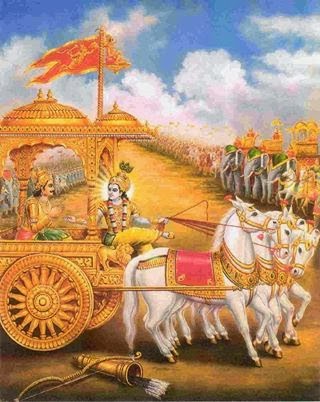Gita : Ch-3. Slo-5.
Srimad Bhagavad-Gitta :
Chapter-3. ( Karma-yogam )
Slokam-5. [ Lord's reply ( continues from slokam-3. ) : All men are forced to do karma helplessly according to the impulses born of the modes of material nature ( guna-s of prakrti ) ; therefore no one can refrain from doing something, not even for a moment. ]
Na hi kascit kshanamapi jatu tishthatyakarmakrt,
Karyate hyavasah karma sarvah prakrtijairgunaih.
kascit jatu = anyone no even once;
kshanam api = even a moment also;
akarmakrt = without doing anything;
na tishthaty hi = certainly not remains idle;
hi = why because;
prakrtijaih gunaih = in the guna-s, which formed ou of Prakrti ( Nature);
sarvah avasah = everyone helplessly (without freedom);
karma karyate = compelled to do ( forced to do) karma.
Actions are spoken of as two-fold in the Paingi scripture. Actions that are dependent upon a cause and and actions which are independent of any cause. The actions that are dependent upon a cause are due to the influence of prakriti, material nature. Independent actions are only manifesting from the Supreme Lord. Therefore the words karyate he avasah means to perform activities fully dependent, this dependence is on the Supreme Lord Krishna. The scriptures also further clarify that ah means the all pervasive Brahmam.
The renunciation of actions factually means not being attached to them. It does not mean actually giving them up, as that is impossible. Nobody neither a wise man or a fool under any circumstances can refrain from actions for a moment. The reason Lord Krishna is stating is that all are compelled to act forced by one's likes and dislikes influenced by one's attachments and aversions arising out of prakriti, material nature and designated by one's past life activities.
It should not be speculated that one is entitled to the fruits of one's actions simply because it is impossibe to fully renounce all actions. To empasise this point Lord Krishna states vimudh-atma meaning one ignorant of the soul. A fool or a wise person can appear inactive without engaging in worldly affairs or Vedic activities. So the sense here is that prakriti, material nature is propelling one to act based on the effects of one’s past actions which are attached to the root of the physical and subtle body. Therefore the conclusion is that one should first purify themselves by performing karma yoga which is actions without desires as prescribed in the Vedas which destroys sins which hinder spiritual development before embarking on the path of jnana yoga the cultivation of spiritual knowledge.
No living being in the material existence can remain inactive even for a moment without initiating or pursuing some activity or another. If one should steadfastly determine to perform absolutely nothing, still one would be compelled into action by the qualities of the the three gunas being sattva or goodness, rajas or passion and tamas or ignorance, all from prakriti, material nature. The effects of these have sprung into existence from one's past life activities. Thus by adhering to karma yoga the yoga of actions without desires one's accumulated sins will gradually dissolve and then mastery over the gunas and prakriti is achieved. At this time the mind has become pure and one becomes qualified for jnana yoga. Otherwise as Lord Krishna states anyone attempting to pursue jnana yoga in lieu of this is a charlatan and all their attempts is merely a charade.
That it is impossible to renounce every single action one makes is what's being clarified here.
To be continued ...





Comments
Post a Comment